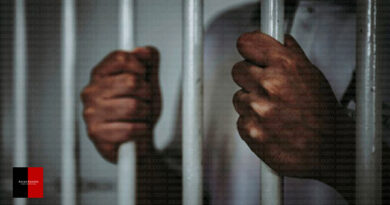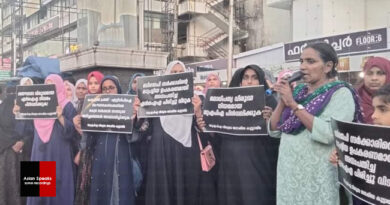UAPA on Masrat Zahra reveals India’s intention in killing journalism in Kashmir further
One more journalist from Kashmir is facing state repression. Freelance journalist Masrat Zahra is charged wih UAPA on April 18th. 13A of UAP Act and 505 IPC are charged on Masrat Zahra for her “anti-national social media posts”. Though the police didn’t mention what are these posts, even to Masrat Zahra herself, it looks like the photos she posted on facebook could have lead the police to invoke charges of UAPA. The act of charging this draconian law on a brave and honest female photographer of Kashmir is yet another attempt of silencing her for she is speaking truth to power fearlessly.

At this point, it is important to know why freelance journalist Masrat Zahra started posting photos from her archives since the CoVID lockdown began. She wanted to show the rest of the world why and how the current CoVID lock down is not something that can be compared to the lockdown in Kashmir. Yes, several Indians had been comparing the CoVID lock down to lock down in Kashmir, and Masrat Zahra wanted to tell the Indians those who ask for tips to Kashmiris to deal with the lock down. On March 30 she wrote on facebook, “As the whole world is under a lockdown and many comparing and seeking tips from Kashmiris who have suffered worst state-imposed lockdowns in the recent years. I want to use a picture everyday here to let the world know how lockdowns are different here”, this text is posted along with a photo of a Kashmiri woman with a young boy and girl, approaching towards a barbed wire. Like several other photo journalists from Kashmir who are archiving the horrors of Indian occupation and putting it out to the world as it is, she continued posting photos from different protests. The photo of a Kashmiri woman who is suffering from panic attacks in the memory of her husband who was killed in a staged encounter by the Indian army in 2000, the photo of belongings of her husband kept by her, Kashmiri children in the vicinity of an armed peronnal, Kashmiri youngsters in protest, how the J&K police manhandles a young man, young children who held the poster of Hiba, the youngest pellet victim of Kashmir during prayer, house of a poet which is destroyed by armed forces, in which he lost his 30 years old poetry too, three women standing in front of an Aazadi graffiti on a shop shutter, elder women in prayer, an armed man checking on the identity card of a Kashmir citizen, an old man removing himself from the barbed wire in front of a police personnal, an elderly man walking through armed men; these photos came along with messages to the world that misreads the stories of Kashmir towards the feeling of ‘seeking tips’ from a people who are occupied for 72 years by India.

The cyber police in a press release on 18th of April stated that a social media user Masrat Zahra “is uploading anti national posts with criminal intention to induce the youth and to promote offences against public tranquility. The facebook user is also believed to be uploading photographs which can provoke the public to disturb law and order. The user is also uploading posts that tantamount to glorify the anti-national activities and dent the image of law enforcing agencies besides causing disaffection against the country.” There is no element of anti-nationalism in her photographs, there is only resistance of a people to an occupier visible in them. The photographs speak stands grounded, and it is quite obvious why they are causing discomfort to those in power. “I am among the very few female photojournalists in Kashmir and have been working really hard to learn and to create my space for the past four years. They (police) want to silence me. They want to suppress me as I bring out the repressed voices and stories of Kashmir. It’s not like other shutdowns in Kashmir where one can go out to work because you can potentially be a risk to your own family if infected. So I had been home and not shared any of my work as I had essentially not been working. Recently I shared photographs I had clicked for a story I had done in 2019. That is what seems to have irked the police,” she said.”Masrat Zahra told to Azaan Javaid who reports for The Print.

Masrat Zahra’s works focus on the women in the face of conflict. During the massive protests against the abrogation of article 370, her photograph of a woman who applied salt on her face to secure self from tear gas was widely shared and her reportage on the protests after abrogation of article 370 had been published in various Indian and international news platforms. She stood by herself up and had been exposing the truth about Kashmir unbending. It is the need of the hour that Indian journalists must stand with Masrat Zahra and journalists of Kashmir who face constant repression and fabricated cases for pursuing their profession. It is important to know what they go through to bring the news out.

Journalists for Freedom, a collective of Indian journalists, condemns the charges on Masrat Zahra and demands the J&K government to revoke UAPA charged on her. We believe cases and detention of Kashmiri journalists are attempts to vilify them and to disrupt documenting history, while Indian media has a huge role in misrepresenting the facts of Kashmir. We stand in solidarity with Kashmir Press Club who demands the charges be revoked. This case is baseless, hateful and with an intention to kill journalism in Kashmir further.
Anan Ashraf
Rijaz
Hari
Prashanth Subrahmanian
Mrudula Bhavani
Haroon
KA Salim
Anamika S
Haneen
Aslah Vadakara
_ Journalists for Freedom
20 April 2020





